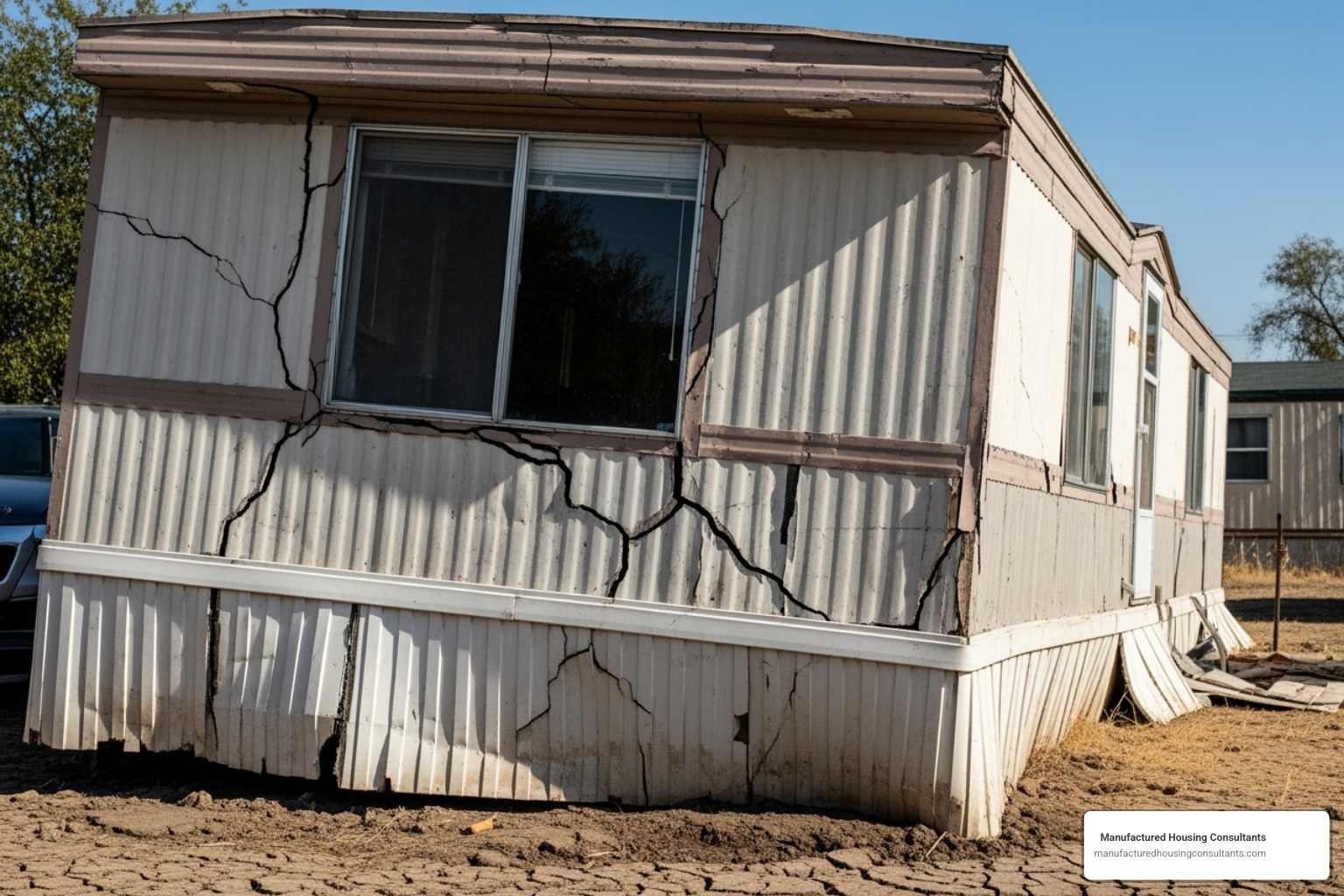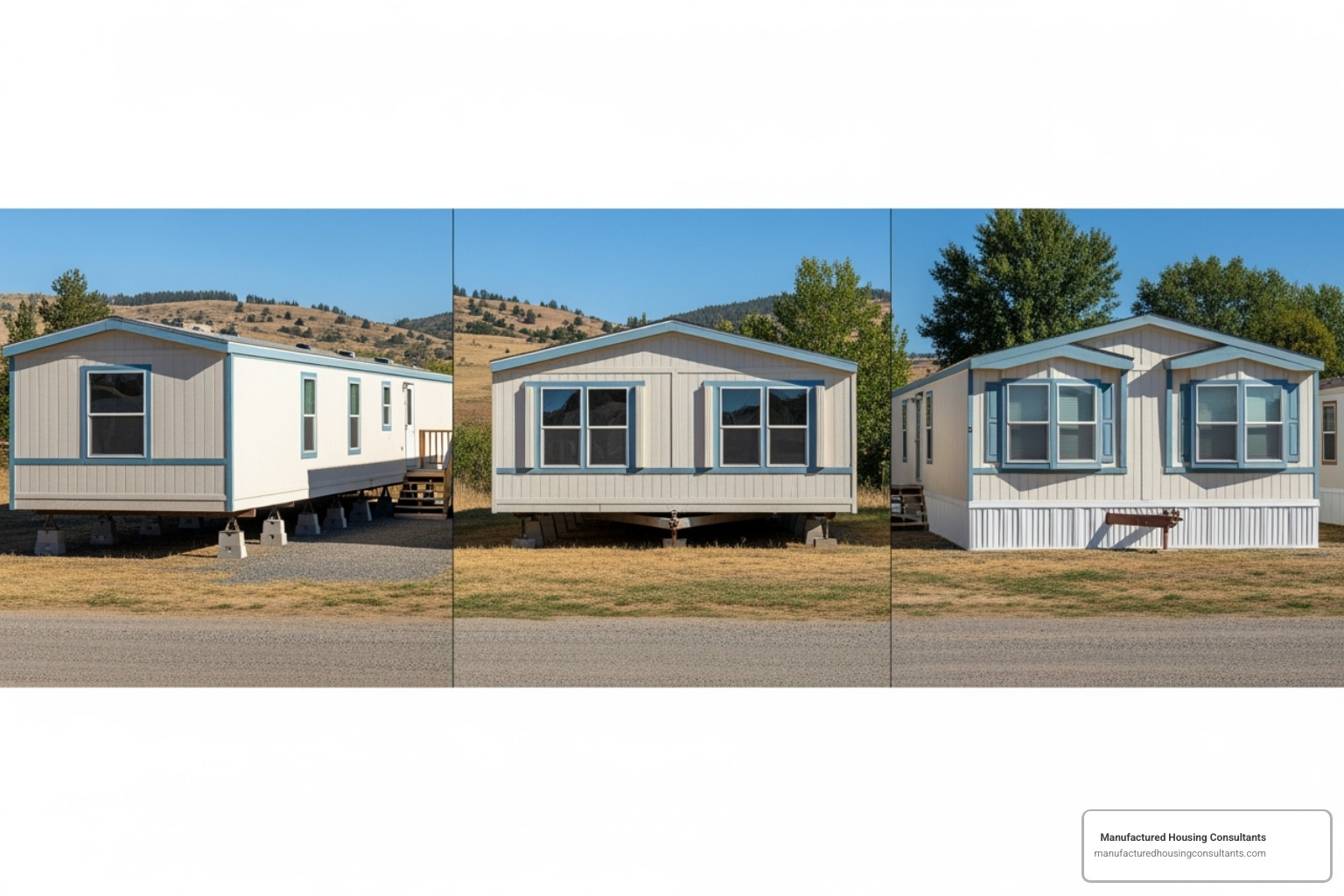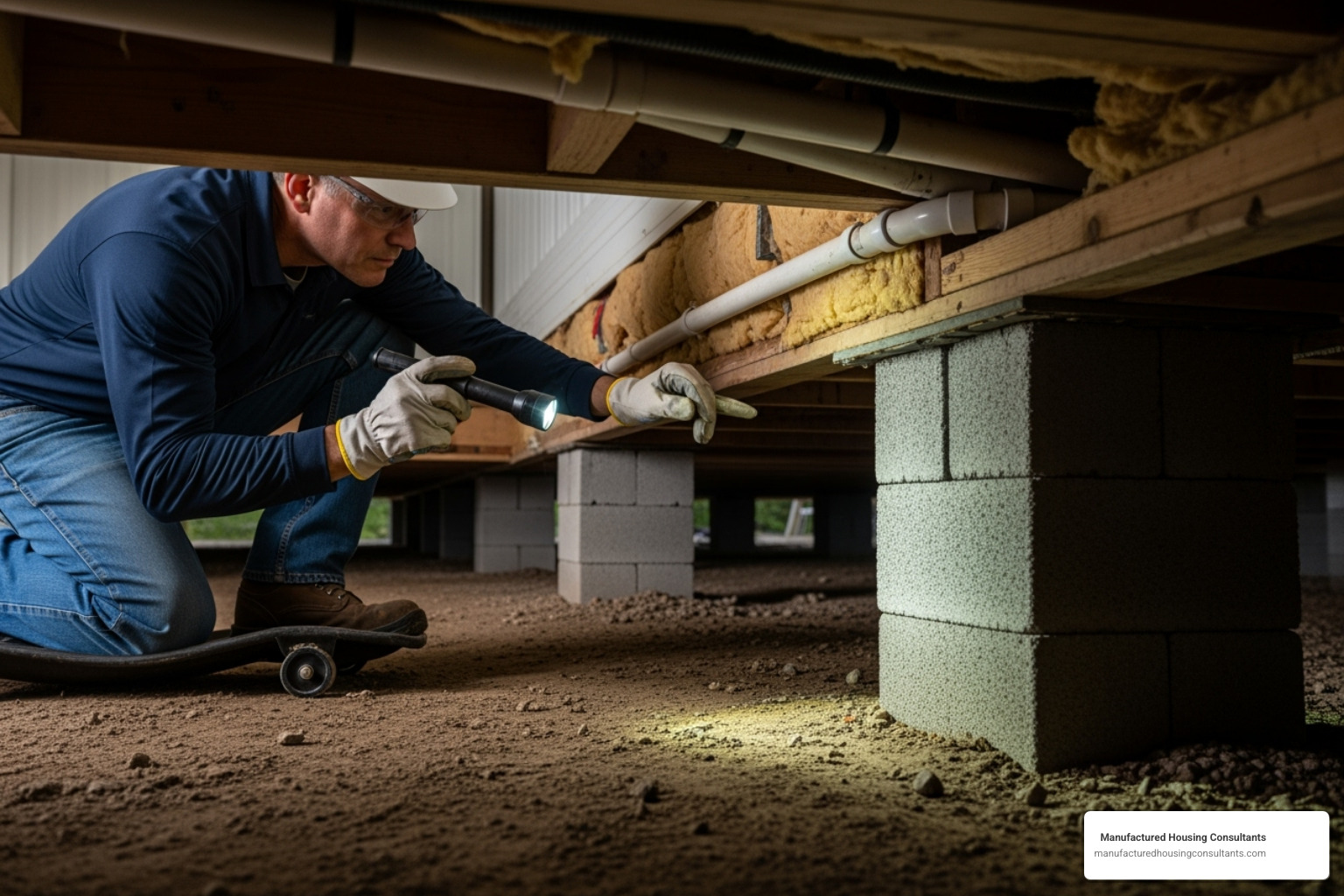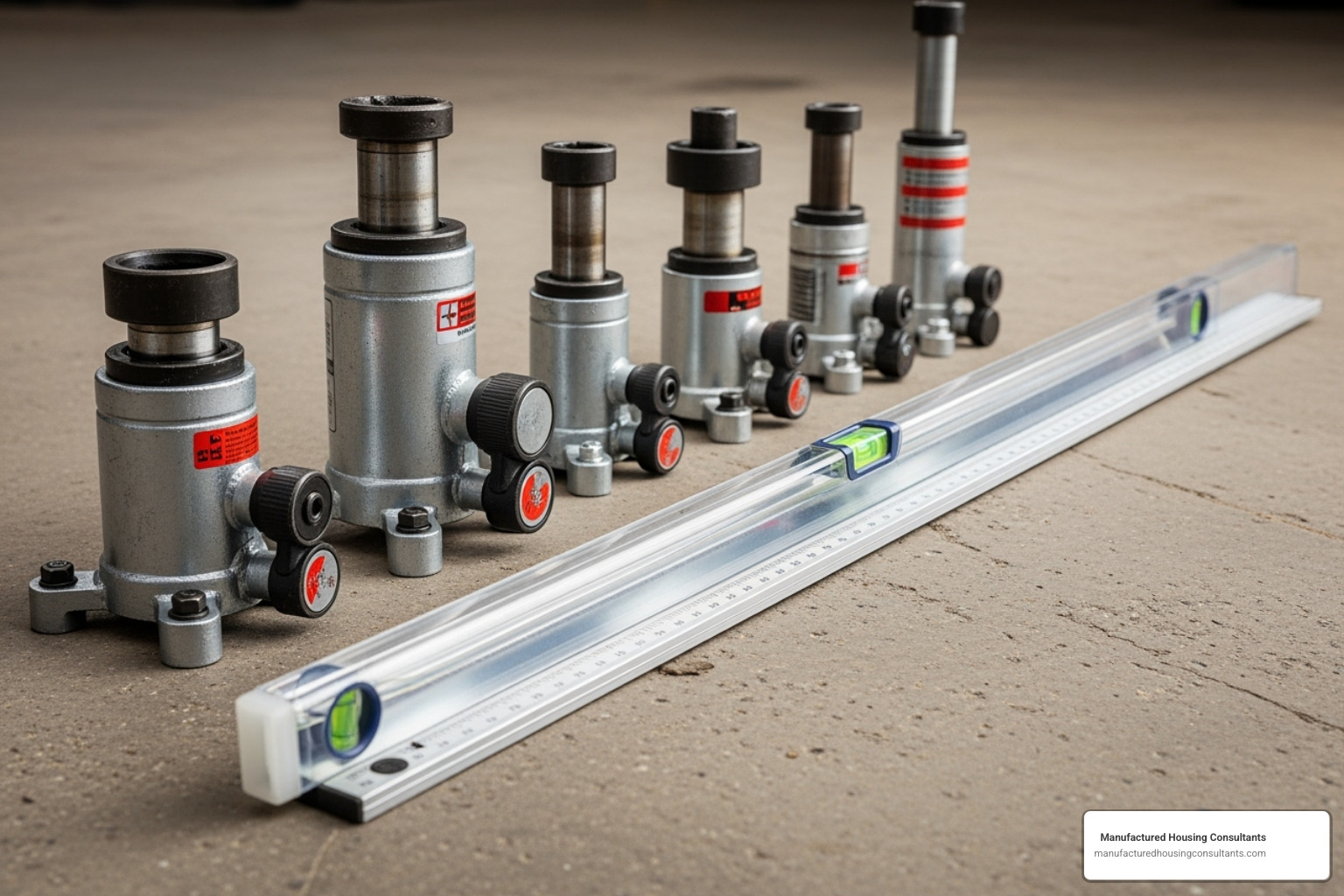Why a Level Mobile Home Matters
Mobile home leveling cost typically ranges from $450 to $900 for most Texas homes, though prices vary based on your home’s size and condition:
- Single-wide homes: $450 – $600
- Double-wide homes: $750 – $900
- Triple-wide homes: $900 – $1,200
Complex projects with foundation repairs can exceed $1,500.
If you’ve noticed doors that won’t close, cracks in your walls, or sloping floors, your mobile home probably needs leveling. This isn’t just about convenience—an unlevel home puts serious stress on your entire structure, leading to costly damage if ignored.
Mobile home leveling is the process of adjusting the piers and supports under your home to restore it to a level position. Over time, Texas’s expansive clay soils—which swell and shrink with moisture changes—cause homes to settle unevenly. Due to ground movement and the home’s weight, most manufactured homes need professional releveling every 3 to 5 years.
When a home is unlevel, the consequences ripple through the structure. Door and window frames shift, causing them to stick or develop gaps that waste energy. Plumbing connections can strain and leak, leading to water damage and potential mold growth. Most importantly, the home’s frame experiences uneven stress, causing cracks in walls and ceilings and weakening its structural integrity over time. What starts as a minor inconvenience can balloon into thousands of dollars in repairs.
Maintaining a level home is not just about preventing damage; it’s about preserving your investment and ensuring a safe, comfortable living environment. It’s a proactive step that saves you money and headaches in the long run, especially given the diverse soil conditions in areas like San Antonio and Von Ormy.

Breaking Down the Mobile Home Leveling Cost
Let’s talk numbers. Understanding what goes into your mobile home leveling cost helps you plan ahead. Several factors can swing the price, from the size of your home to the condition of its foundation. Here’s a walkthrough of the main cost drivers for this essential maintenance in Texas.
Average Mobile Home Leveling Cost by Home Size
The size of your mobile home is the biggest factor in determining your cost. More square footage means more support points to adjust, more materials, and more time for the crew to complete the job.
- Single-wide mobile homes are the most budget-friendly, typically running between $450 and $600. They have a smaller footprint and fewer piers to adjust.
- Double-wide mobile homes usually cost between $750 and $900. They require leveling two separate sections while keeping the “marriage line” perfectly aligned.
- Triple-wide mobile homes are the largest and most complex, with leveling costs typically between $900 and $1,200 or more.
Costs may also be expressed as $5 to $10 per square foot. For more context on the different foundation systems that support these homes, check out our guide on Mobile Home Foundation Types.
Here’s a quick reference table for typical mobile home leveling cost ranges in Texas:
| Mobile Home Type | Average Cost Range in Texas | Notes |
|---|---|---|
| Single-Wide | $450 – $600 | Least expensive, fewer piers. |
| Double-Wide | $750 – $900 | Two sections, requires marriage line alignment. |
| Triple-Wide | $900 – $1,200+ | Largest homes, most complex. |

Key Factors That Influence the Price
Beyond size, several other factors affect the final bill. Knowing them helps you have more informed conversations with contractors.

- Foundation Condition: If piers and blocks just need adjusting, costs are lower. Replacing crumbling or missing supports can add $200 to $500 per pier. Severe foundation issues can push costs from $1,500 to over $5,000.
- Severity of Unleveling: A slightly off-kilter home requires minor, cheaper adjustments than a dramatically tilted one, which needs more time-intensive work.
- Accessibility: Limited clearance under the home or obstructions like decks and AC units increase labor time and costs.
- Labor Rates in Texas: Rates vary by location. You might pay more in a city like San Antonio than in a smaller community like Von Ormy. However, rural areas may have fewer contractors, leading to travel fees.
- Material Costs: Prices vary for concrete blocks ($3-$7 each), steel piers ($10-$20 each), and adjustable screw jacks ($25-$45 each).
- Skirting: Removing and reinstalling skirting adds labor time. If it needs full replacement, this can add $300 to $900.
- Additional Repairs: Leveling can reveal other issues like drainage problems or the need for tie-down reinforcement, which add to the total cost.
DIY vs. Professional Mobile Home Leveling Cost
While the DIY route might seem tempting to save money, it comes with significant risks.

The DIY route requires a tool investment of $200 to $500 and is extremely dangerous. Working under a multi-ton structure without experience can lead to catastrophic failure, serious injury, or costly structural damage. A DIY job can also take days of difficult labor with no warranty if something goes wrong.
Professional leveling costs between $450 and $1,200+ but includes expertise, specialized equipment, and safety protocols. Professionals understand Texas soil conditions, work efficiently (most jobs take 3-8 hours), and often provide a warranty. For the safety and integrity of your home, professional service is the wise investment. While Manufactured Housing Consultants specializes in selling homes and initial site preparation across Texas, it’s important to clarify that we do not perform ongoing releveling services. This specialized maintenance should be handled by a dedicated contractor. If you’re thinking about other ways to improve your manufactured home, our Mobile Home Renovations: Tips and Tricks guide has some great ideas.
Your Leveling Questions Answered
Now that you understand the costs, let’s cover other common questions about the process, from identifying the need for leveling to saving money and finding the right help for your Texas home.
Signs Your Home Needs Leveling and How Often to Check
Your mobile home will tell you when something is wrong. Catching these warning signs early can save you from expensive repairs down the road. Look for:
- Sticking Doors and Jammed Windows: If doors won’t latch or windows that used to slide smoothly now wrestle with you, your home’s frame has likely shifted.
- Wall and Ceiling Cracks: Cracks appearing around door frames, window frames, or where walls meet ceilings indicate structural stress.
- Sloping or Bouncy Floors: You might notice a slight incline when walking, see a ball roll on its own, or feel the floor give as you walk.
- Persistent Creaking Noises: These sounds often mean components are rubbing against each other due to a shifted frame.
- Skirting and Siding Issues: Buckling, warping, or gaps in your skirting or exterior siding point to foundation movement.
How often should you check? Perform a visual inspection every six months. Plan for professional releveling every 3 to 5 years. However, homes on the expansive clay soils common around San Antonio and Von Ormy may need more frequent attention. It’s also wise to do an extra inspection after severe weather events like flooding or drought. To learn more about manufactured home ownership, see our guide on the Pros and Cons of Living in a Mobile Home.
The Leveling Process and How to Save Money
Understanding the leveling process and how to manage costs can reduce stress.
The Process: A professional crew will first assess your home with precise water levels. After removing the skirting, they use hydraulic jacks to slowly lift the structure, typically no more than an inch at a time. They then adjust, add, or replace supports and shims to bring everything level. The job usually takes 3-5 hours for a single-wide and 6-8 hours for a double-wide.
How to Save Money: The single most important step is to get multiple quotes—at least three from different local Texas contractors. Also consider these tips:
- Schedule Off-Season: Booking during cooler, drier months (November-February) can sometimes yield discounts of 5-15%.
- Bundle Services: If you need other under-home work like plumbing, ask about bundling jobs to save on labor costs.
- Address Root Causes: Investing in better drainage can prevent frequent, costly releveling.
- Get it in Writing: Always get a contract that details the scope of work, materials, pricing, and warranty terms. A warranty provides valuable protection.
By taking these steps, you can manage your mobile home leveling cost effectively. For more tips, see our article on Things to Know Before You Remodel a Mobile Home.
Finding the Right Foundation and Leveling Support in Texas
Starting with a solid, level foundation is the best strategy for preventing future problems. At Manufactured Housing Consultants, we understand the unique challenges of Texas terrain, especially in our service areas like San Antonio and Von Ormy.
We specialize in ensuring your manufactured home is set up for long-term stability from day one with our expert site preparation services. To be clear, mobile home releveling is a maintenance service that we do not offer. Our expertise lies in the initial home sale and foundation setup. For ongoing maintenance like releveling, you will need to hire a specialized contractor.
Don’t let an unlevel home tilt your peace of mind. If you’re experiencing any of the signs we’ve discussed, we encourage you to seek quotes from reputable local professionals. While we don’t perform leveling, we are your trusted partners for finding and setting up a new manufactured home in the San Antonio area and beyond.
We believe everyone deserves a home that stands strong. That’s why we’re committed to supporting you through every stage of manufactured home ownership. Explore our site preparation services to see how we lay the groundwork for a stable and comfortable home.




